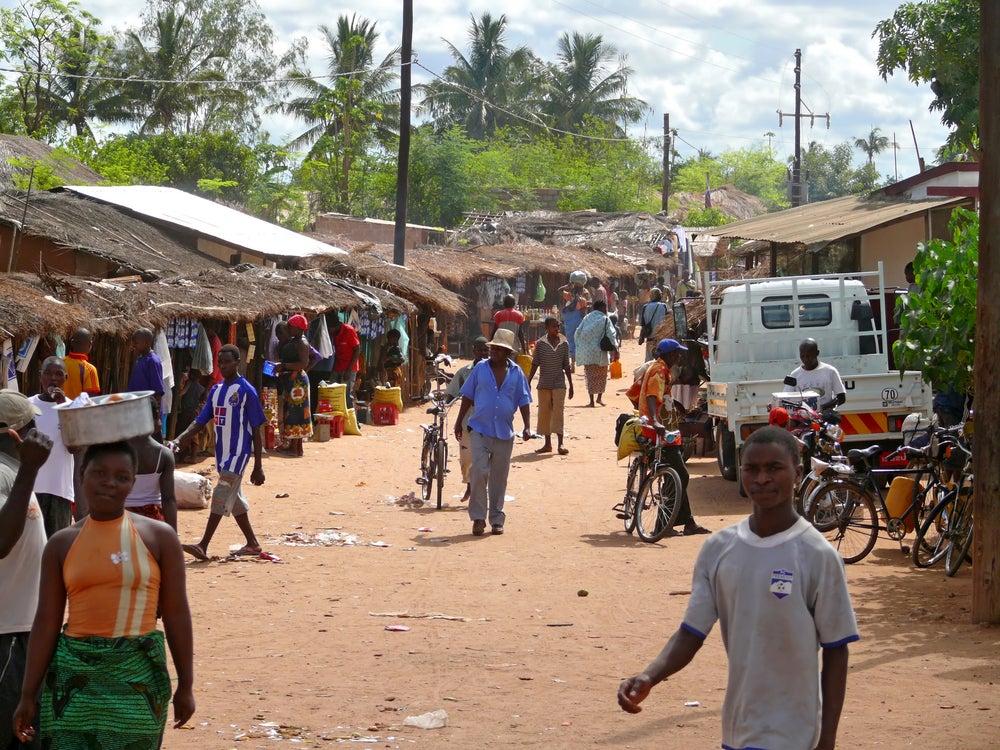 Photo: Svetlana Arapova/Shutterstock
Photo: Svetlana Arapova/Shutterstock
As the spread of COVID-19 expands in less developed countries, policymakers will face an additional challenge that was largely absent in more developed economies – the informal sector. In a traditional economic downturn, the informal sector serves as a buffer to negative shocks, temporarily absorbing the workforce pushed out of the formal sector. However, under these unprecedented circumstances with many countries on the verge of a complete shut-down, the vulnerabilities of the informal sector will likely exacerbate the crisis. On one hand, effective enforcement of social distancing policies will take away the only means of survival for millions of the world’s poorest. On the other hand, if this segment of the economy remains in operation, we risk worsening the pandemic with an enormous human toll.
Using data from informal business surveys for nine cities from four countries (Mozambique, Somalia, Zambia and Zimbabwe) conducted recently by the World Bank’s Enterprise Analysis Unit, we highlight three pertinent issues – (1) the prevalence of informal businesses, (2) their importance to the livelihood of a large portion of the population, and (3) the use of digital financial services in this sector. The three should be considered when designing policies in countries with large informal economies, especially when taking actions aimed at restricting market activity or assisting individuals and businesses affected by COVID-19. These surveys used in the analysis were conducted following a sampling approach that makes it possible to provide estimates of the total number of informal businesses in a well-defined geographical space, usually an urban center including its peripheries.
Informal businesses are numerous and dominate market activities in these economies. Informal businesses make up a large segment of businesses operating in many developing economies. In the defined geographical areas that were sampled in these four countries , on average, there are about 7 businesses operating informally for every formal business. In the three cities surveyed in Mozambique, a country on the higher end of informality, only 1 in 10 businesses is registered with authorities. For Bosaso and Mogadishu, on average, there are 2 informal businesses for every formal business in operation. Not only are informal businesses predominant, they are also the main source of employment in many urban centers of developing economies. On average, in the 9 cities, there is one informal business for every 35 working age individuals. In Beira, the fourth-largest city by population in Mozambique, there is one informal business for every 5 working age individuals.
For many that are engaged in informal businesses, the business is often the only source of livelihood for the owners and their family. Informal business owners are among the hardest hit during crises like this one. Even in normal times, given the limited income produced by their activities, owners of informal businesses live hand-to-mouth. Their livelihood depends critically on being able to run their businesses on a daily basis. Crises such as the one brought up by the novel coronavirus that curtail operations of businesses and dampen the demand for their products and services further exacerbate informal business owners’ precarious means of survival.
While the average informal business employs fewer people and is less productive compared to formal ones, the informal sector is an important source of livelihood for a considerable segment of the population in many developing economies. Data from the four countries analyzed attest to this fact. For about 70% the businesses interviewed, the main owners are also the main breadwinner for their household, with considerable variation across cities, and in 60% of cases the business is the only employment for the main breadwinner of the household. The stark reality is that for half of the respondents, the business is the sole source of income for the business owner’s family. Given that a typical business owner lives in a household with 5 family members, it is clear how critical informal businesses are as a means of livelihood for a considerable portion of the population in these countries.
Individuals working in these businesses are not recognized by formal institutions, hence lack access to social safety nets that employees in the formal sector enjoy. Further, the low level of earnings in these businesses means that people living on income from informal businesses are quite vulnerable. Using total sales as crude proxy for earnings, a typical informal business in the 9 cities makes sales of about $7 a day (in 2018 prices). About 45% of the businesses make $2 or less per day. Any disruption in the operations of these businesses will not only jeopardize the existence of the business itself but will also put individuals owning these businesses and their families at risk. Since most of these business owners operate with limited savings, they may struggle with the hard choice of staying home and facing starvation or running the business and risking infection, thereby accentuating their financial difficulties as well as the spread of COVID-19.
These businesses widely use mobile money – could it be a silver lining? In the above discussion, we emphasize that policy makers can’t afford to ignore the informal sector in their efforts to slow down the spread of COVID-19 and minimize its effect on lives and livelihoods. However, businesses in the informal sector also pose important challenges for policy makers seeking to assist them, given the lack of records on their operations and even of their existence.
Perhaps the silver lining is the use of mobile money which is widespread among informal businesses owners. Somewhere between 20 percent (in Nampula, Mozambique) and 82 percent (in Mogadishu, Somalia) of informal businesses use mobile money in their operations. The prevalence of mobile money among informal business owners is generally higher than the average population. For instance, in Mozambique, roughly about 40% of informal business owners use mobile money, twice the value for the average population as measured by Findex. Studies have shown that mobile money users are largely unaffected by shocks compared to those that have not integrated this financial technology; as such, mobile money adoption could prove to be useful in reaching individuals and businesses. For some businesses which would not require physical contact to continue operating, the use of mobile money may also help to avoid physical contact in the exchange of money.
Policies aimed at dealing with the COVID-19 outbreak must consider that the informal sector represents a very large segment of society in many developing countries and it serves as an important means of survival for millions. Technology adoptions such as mobile money could be one possible avenues to reach these businesses for direct supports. Without carefully curated policies, the informal sector is left with limited options of contagion or starvation.
Given the importance of understanding the impact of the Covid-19 crisis on this very vulnerable sector, the Enterprise Surveys is adapting the survey instrument for informal businesses and adding specific questions related to the spread of COVID-19 for upcoming surveys to assess the impact on the informal sector. You can access the micro data and find out more of our upcoming projects at the Enterprise Surveys website.




Join the Conversation